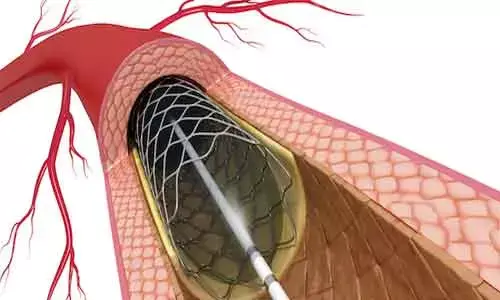- Home
- Medical news & Guidelines
- Anesthesiology
- Cardiology and CTVS
- Critical Care
- Dentistry
- Dermatology
- Diabetes and Endocrinology
- ENT
- Gastroenterology
- Medicine
- Nephrology
- Neurology
- Obstretics-Gynaecology
- Oncology
- Ophthalmology
- Orthopaedics
- Pediatrics-Neonatology
- Psychiatry
- Pulmonology
- Radiology
- Surgery
- Urology
- Laboratory Medicine
- Diet
- Nursing
- Paramedical
- Physiotherapy
- Health news
- Fact Check
- Bone Health Fact Check
- Brain Health Fact Check
- Cancer Related Fact Check
- Child Care Fact Check
- Dental and oral health fact check
- Diabetes and metabolic health fact check
- Diet and Nutrition Fact Check
- Eye and ENT Care Fact Check
- Fitness fact check
- Gut health fact check
- Heart health fact check
- Kidney health fact check
- Medical education fact check
- Men's health fact check
- Respiratory fact check
- Skin and hair care fact check
- Vaccine and Immunization fact check
- Women's health fact check
- AYUSH
- State News
- Andaman and Nicobar Islands
- Andhra Pradesh
- Arunachal Pradesh
- Assam
- Bihar
- Chandigarh
- Chattisgarh
- Dadra and Nagar Haveli
- Daman and Diu
- Delhi
- Goa
- Gujarat
- Haryana
- Himachal Pradesh
- Jammu & Kashmir
- Jharkhand
- Karnataka
- Kerala
- Ladakh
- Lakshadweep
- Madhya Pradesh
- Maharashtra
- Manipur
- Meghalaya
- Mizoram
- Nagaland
- Odisha
- Puducherry
- Punjab
- Rajasthan
- Sikkim
- Tamil Nadu
- Telangana
- Tripura
- Uttar Pradesh
- Uttrakhand
- West Bengal
- Medical Education
- Industry
Stent-related adverse events continue to accrue up to 5 years after PCI: JACC

Delhi: Stent-related adverse events continue to accrue at a rate of about 2% per year from 1 to 5 years after the percutaneous coronary intervention (PCI), with all the stent types. Findings, published in the Journal of the American College of Cardiology, are based on a meta-analysis of individual patient data on more than 25,000 patients undergoing PCI with bare-metal and first- and second-generation drug-eluting stents.
The majority of stent-related major adverse cardiovascular events (MACE) after PCI are believed to occur within the first year. Very-late (>1-year) stent-related MACE have not been well described. Mahesh V. Madhavan, NewYork-Presbyterian Hospital/Columbia University Irving Medical Center, New York, New York, and colleagues conducted the study to assess the frequency and predictors of very-late stent-related events or MACE by stent type.
For the purpose, the researchers pooled individual patient data from 19 prospective, randomized metallic stent trials maintained at a leading academic research organization.
Very-late MACE (a composite of cardiac death, myocardial infarction [MI], or ischemia-driven target lesion revascularization [ID-TLR]), and target lesion failure (cardiac death, target-vessel MI, or ID-TLR) were assessed within year 1 and between 1 and 5 years after PCI with bare-metal stents (BMS), first-generation drug-eluting stents (DES1) and second-generation drug-eluting stents (DES2). A network meta-analysis was performed to evaluate direct and indirect comparisons.
Among 25,032 total patients, 3,718, 7,934, and 13,380 were treated with BMS, DES1, and DES2, respectively.
Key findings of the study include:
- MACE rates within 1 year after PCI were progressively lower after treatment with BMS versus DES1 versus DES2 (17.9% vs. 8.2% vs. 5.1%, respectively).
- Between years 1 and 5, very-late MACE occurred in 9.4% of patients (including 2.9% cardiac death, 3.1% MI, and 5.1% ID-TLR).
- Very-late MACE occurred in 9.7%, 11.0%, and 8.3% of patients treated with BMS, DES1, and DES2, respectively (p < 0.0001), linearly increasing between 1 and 5 years.
- Similar findings were observed for target lesion failure in 19,578 patients from 12 trials.
- Findings were confirmed in the network meta-analysis.
"In this study, very late stent-related events occurred between 1 and 5 years after PCI at a rate of ∼2%/year with all stent types," wrote the authors. "New approaches are required to improve long-term outcomes after PCI."
The study, "Stent-Related Adverse Events >1 Year After Percutaneous Coronary Intervention," is published in the Journal of the American College of Cardiology.
Dr Kamal Kant Kohli-MBBS, DTCD- a chest specialist with more than 30 years of practice and a flair for writing clinical articles, Dr Kamal Kant Kohli joined Medical Dialogues as a Chief Editor of Medical News. Besides writing articles, as an editor, he proofreads and verifies all the medical content published on Medical Dialogues including those coming from journals, studies,medical conferences,guidelines etc. Email: drkohli@medicaldialogues.in. Contact no. 011-43720751


